Top Police Dog Breeds
Police Dog Breeds | Best Police Dog Breeds Throughout history, dogs have served alongside humans in various capacities, and law enforcement is no exception. Often referred to as K-9 units (from the German “Kanine,” meaning canine), police dogs are specially trained partners who play a vital role in protecting communities and upholding the law.
This comprehensive guide delves into the fascinating world of police dogs, exploring the top breeds used in law enforcement around the globe:
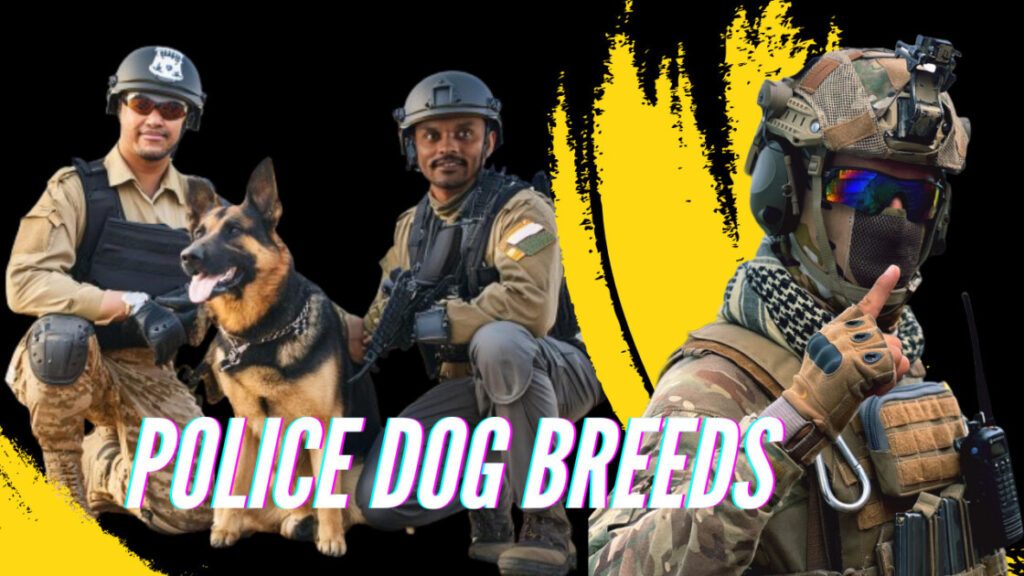
Table of Contents
The Unwavering Bond: The History and Importance of Police K-9 Units
The concept of using dogs in law enforcement dates back centuries. Bloodhounds were utilized for tracking purposes in medieval Europe, with documented use in England as early as the 12th century.
The modern era of K-9 units emerged in the late 19th and early 20th centuries, with countries like Germany and Austria pioneering formal training programs for police dogs. Following World War II, the practice gained widespread adoption across the globe.
Importance of Police K-9 Units: Police Dog Breeds
- Enhanced Detection: Police dogs possess exceptional olfactory (smell) and auditory (hearing) capabilities, aiding in detecting narcotics, explosives, and even human remains.
- Superior Tracking: Their tracking abilities are invaluable for locating missing persons, suspects, or stolen goods.
- Apprehension and Security: Police dogs can effectively apprehend criminals, deter crime, and protect officers during high-risk situations.
- Public Relations: Well-trained K-9 units can foster positive interactions between law enforcement and the community, promoting trust and understanding.
Top Police Dog Breeds: Unpacking Their Skills and Specialties
German Shepherd:
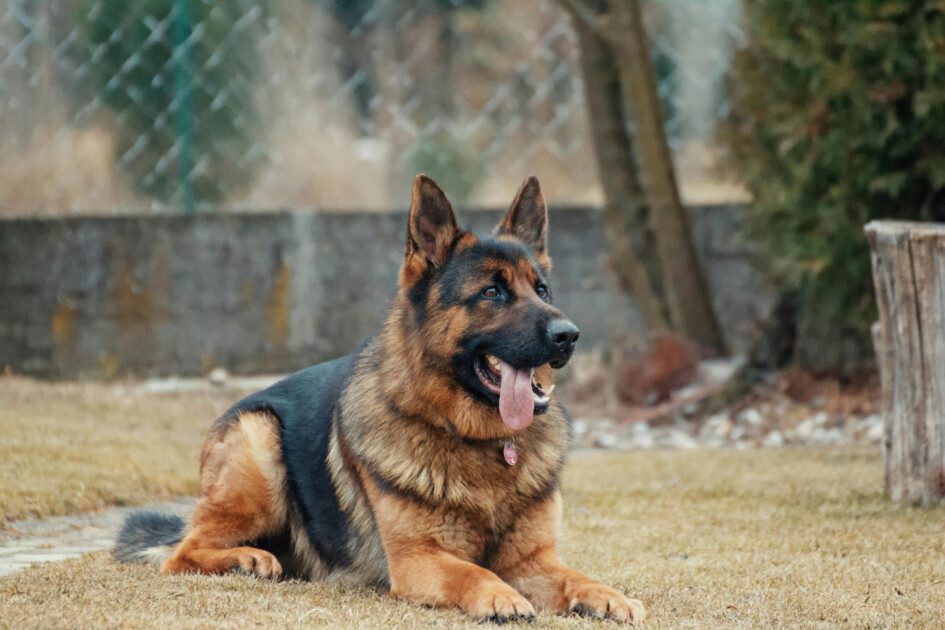
- Iconic Status: The German Shepherd is arguably the most recognizable police dog breed globally.
- Strengths: Renowned for their intelligence, trainability, loyalty, and courage. They excel in various roles, including patrol work, suspect apprehension, and search and rescue.
- Weaknesses: Susceptible to certain health conditions like hip dysplasia. May require experienced handlers due to their protective nature.
Belgian Malinois:
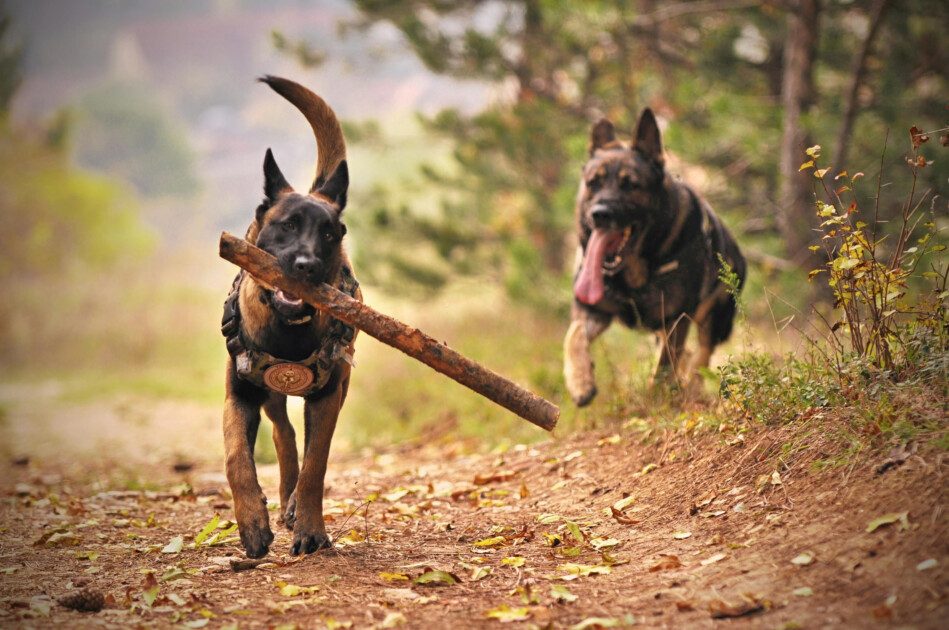
- Agile Powerhouse: Known for their athleticism, high energy levels, and intense focus.
- Strengths: Highly trainable and excels in patrol work, narcotics detection, and search and rescue. Their agility makes them well-suited for building searches and high-mobility situations.
- Weaknesses: High energy levels require experienced handlers to provide adequate exercise and mental stimulation.
Bloodhound:
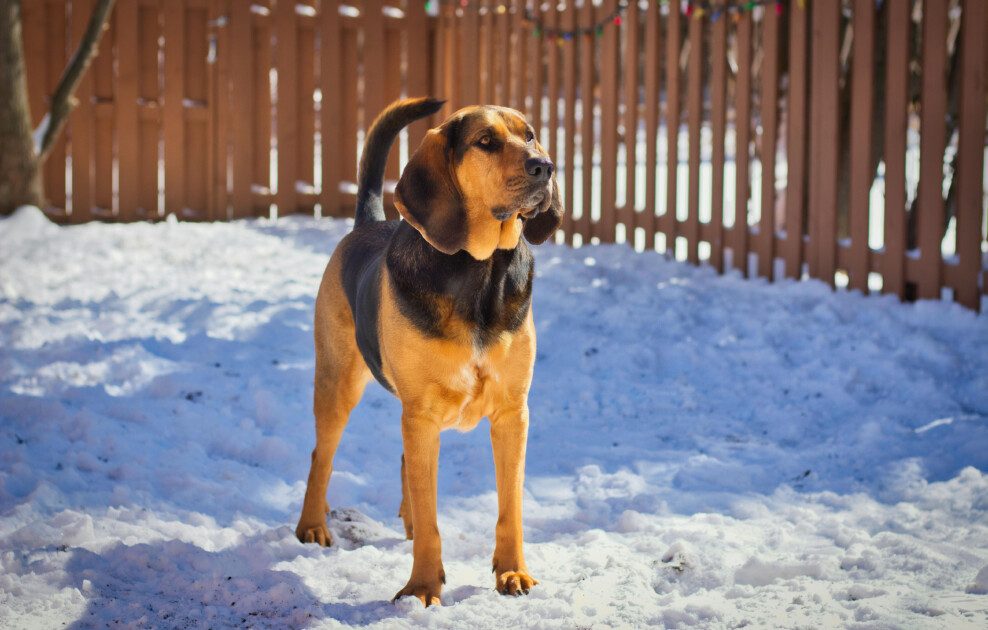
- Master Tracker: Possesses an unparalleled sense of smell, making them ideal for tracking missing persons, and criminals, and even locating specific scents in crime scenes.
- Strengths: Their tracking abilities are legendary. They are also relatively low-maintenance dogs in terms of grooming.
- Weaknesses: Independent nature and strong tracking instincts may require experienced handlers. Not ideal for all police work due to their focus on scent tracking.
Dutch Shepherd:
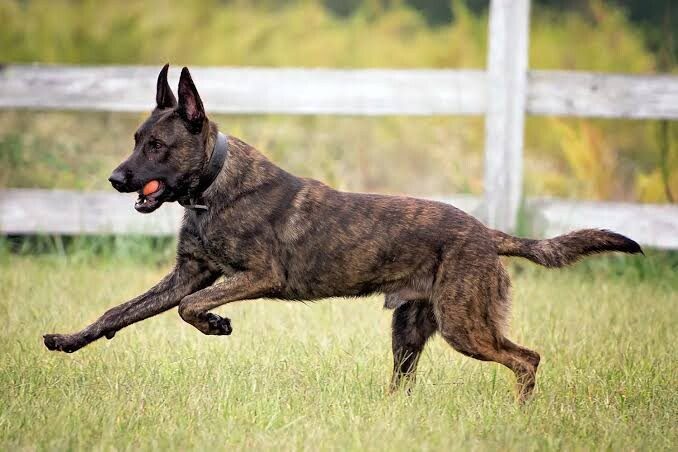
- Versatile Protector: A close relative of the German Shepherd, the Dutch Shepherd is known for its versatility and protective instincts.
- Strengths: Highly trainable and excel in patrol work, narcotics detection, and personal protection.
- Weaknesses: Similar to German Shepherds, they may require experienced handlers due to their protective nature. Susceptible to some health conditions.
Labrador Retriever:

- Friendly Detective: Despite their playful reputation, Labradors are also highly intelligent and trainable, making them valuable assets for police work.
- Strengths: Renowned for their gentle and friendly temperament, making them well-suited for public relations and working with children. They excel in narcotics and explosives detection due to their excellent sense of smell.
- Weaknesses: Their eagerness to please can sometimes overshadow their focus during intense situations. May require additional training to develop the necessary drive for certain police work tasks.
Doberman Pinscher:
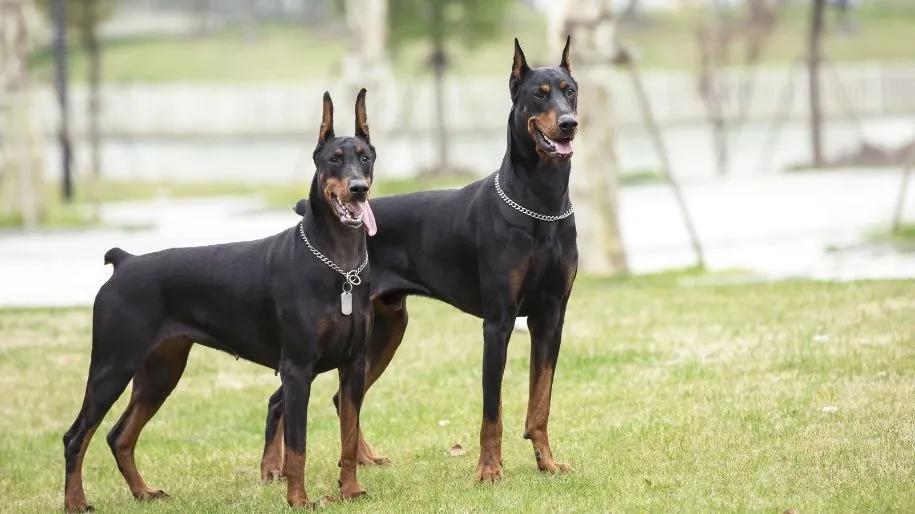
- Fearless Guardian: Doberman Pinschers are known for their intelligence, loyalty, and unwavering courage.
- Strengths: Excellent guard dogs with a formidable presence. Their athleticism and trainability make them suitable for patrol work, apprehension, and search and rescue.
- Weaknesses: Their guarding instincts require proper socialization and training to prevent over-protectiveness. May require experienced handlers due to their high energy levels.
Other Notable Police Dog Breeds (Bonus Section):
- Giant Schnauzer: Large and powerful, these intelligent dogs excel in patrol work and personal protection.
- Airedale Terrier: Energetic and versatile, Airedale Terriers can be trained for various roles, including narcotics detection and search and rescue.
- Boxer: Loyal and athletic, Boxers are known for their intelligence and trainability, making them suitable for patrol work and drug detection.
- Also Read –
- Finding the Best Fit: A Guide to Pet Hospitals Including Banfield, BluePearl & More (International Focus)
- Top 10 Small Dog Breeds for Families: A Pet Lover’s Guide
- Secret Weapon for Pet Parents: Master Pet Supplies Plus Online!
- Prioritizing Your Pet’s Well-Being: A Global Guide to Preventative Pet Health, Including Michiana 2024-25
- Don’t Let Your Furever Friend Become Lost Forever: Badass Pet ID Tags, Free Options, and Microchip Must-Knows
The Making of a K-9 Hero: Training, Selection, and Handler Development
The journey of a police dog from pup to partner is a rigorous and specialized process.
- Selection: Breed, temperament, health, and trainability are crucial factors considered during the selection process. Puppies with a strong prey drive, focus, and a willingness to work are ideal candidates.
- Training: Police dog training is extensive and can last up to a year or more. It focuses on obedience, socialization, specific skill development (e.g., tracking, detection), and building a strong bond between the dog and the handler.
- Handler Development: Police dog handlers undergo rigorous training as well. This training equips them with the knowledge, skills, and techniques to effectively handle, train, and care for their canine partners. Building trust and a strong working relationship is paramount.
The Diverse Roles of Police Dogs: From Crime Scene Investigation to Search and Rescue
Police dogs play a vital role in various aspects of law enforcement, extending far beyond simply apprehending criminals. Here’s a glimpse into their diverse duties:
- Patrol Work: Police dogs accompany officers on patrol, deterring crime, assisting with crowd control, and providing backup during high-risk situations.
- Narcotics Detection: Their exceptional sense of smell makes them invaluable for detecting illegal drugs, both at crime scenes and during traffic stops.
- Explosives Detection: Specially trained dogs can detect explosives, helping to ensure public safety at airports, government buildings, and during high-profile events.
- Tracking: Police dogs are instrumental in tracking missing persons, suspects, or stolen goods, often navigating challenging terrains or following faint scents.
- Search and Rescue: These canine lifesavers assist in locating people trapped in collapsed buildings, lost in wilderness areas, or buried under avalanches.
- Search and Seizure: Police dogs can be trained to locate specific items like firearms or hidden evidence during crime scene investigations.
Beyond Brawn: The Unique Temperament Traits of Effective Police Dogs
While physical strength and athleticism are important qualities, the temperament of a police dog is equally crucial. Here are some key traits:
- Trainability: The ability to learn and retain commands quickly is essential.
- Focus and Drive: These dogs need to maintain focus and complete tasks even in distracting or high-pressure environments.
- Temperament: Stable and courageous, with a willingness to work and a strong prey drive (for tracking and apprehension tasks).
- Socialization: Proper socialization ensures the dog can interact appropriately with the public and other animals encountered during police work.
- Confidence: Police dogs must be confident and decisive in their actions, especially during apprehension or search and rescue operations.
The Future of K-9 Units: Embracing Technology and Evolving Roles
The world of police K-9 units is constantly evolving. Here’s a glimpse into the future:
- Technological Integration: Advancements in wearable technology and drone integration may enhance the communication, tracking, and overall effectiveness of K-9 units.
- Specialized Training: Police dogs may be trained for even more specialized roles, such as cybercrime investigations or detecting specific types of illegal substances.
- Public Relations: The positive impact of K-9 units on community relations is likely to be further emphasized, fostering trust and understanding between law enforcement and the public.
- Ethical Considerations: …along with proper care and retirement plans, will ensure these canine partners continue to serve with confidence and comfort.
Fascinating Facts and Stories: Celebrating the Legacy of Police Dogs
Police dogs have a rich history filled with remarkable achievements and unwavering dedication. Here are some captivating stories to illustrate their invaluable contributions:
- Heroic Rescues: In 2019, a Belgian Malinois named Kai helped locate a missing 7-year-old boy lost in a dense forest for over 24 hours. Kai’s exceptional tracking skills led search and rescue teams directly to the unharmed boy.
- Narcotics Detection Powerhouse: A Labrador Retriever named Buster holds the record for the largest cocaine seizure by a K-9 unit in the United States. Buster sniffed out over 2,000 pounds of cocaine hidden within a shipment of furniture.
- World War I Hero: A German Shepherd named Sergeant Fritz is credited with saving countless lives during World War I. Fritz was trained to locate wounded soldiers on the battlefield, often venturing into dangerous no-man’s land to find them.
- Therapy and Community Outreach: Many retired police dogs transition into therapy roles, providing comfort and support to victims of crime or those struggling with PTSD. Additionally, K-9 units often participate in community outreach programs, fostering positive interactions between the public and law enforcement.
Conclusion: Canine Partners for a Safer World
Police dogs are more than just loyal companions; they are highly trained professionals who play a vital role in protecting communities and upholding the law. Their unwavering dedication, exceptional skills, and unique bond with their handlers make them invaluable assets in the fight against crime.
As technology evolves and the landscape of law enforcement continues to change, the future of K-9 units promises even greater integration and specialization. However, one thing remains constant: the unwavering bond between these canine crimefighters and their human partners, a bond that continues to make our communities safer.
This comprehensive guide has explored the fascinating world of police dogs. We hope you gained valuable insights into these exceptional animals and the vital role they play in law enforcement.
Police Dog FAQs: Unveiling the Canine Crimefighters
What are police dogs (K-9 units) used for?
Police dogs assist law enforcement in various ways, including patrol work, narcotics and explosives detection, tracking missing persons or criminals, search and rescue, and apprehension.
What are the most common police dog breeds?
German Shepherds, Belgian Malinois, Bloodhounds, Dutch Shepherds, and Labrador Retrievers are some of the most popular breeds used in police work.
Are there any other breeds used as police dogs?
Yes, other breeds like Giant Schnauzers, Airedale Terriers, and Boxers can be trained for specific police tasks.
How are police dogs chosen?
Selection focuses on breed, temperament, health, and trainability. Puppies with a strong prey drive, focus, and eagerness to work are ideal candidates.
How long does it take to train a police dog?
Extensive training can last up to a year or more, focusing on obedience, socialization, specific skills, and building a strong bond with the handler.
Do police dog handlers need special training?
Absolutely! Handlers undergo rigorous training to effectively handle, train, and care for their canine partners.
What are the strengths and weaknesses of German Shepherds as police dogs?
Strengths: intelligent, trainable, loyal, courageous. Weaknesses: susceptible to some health conditions, may require experienced handlers due to protectiveness.
What makes Belgian Malinois well-suited for police work?
Strengths: athletic, energetic, highly focused. Weaknesses: high energy levels require experienced handlers for proper exercise and mental stimulation.
Why are Bloodhounds so good at tracking?
Their exceptional sense of smell makes them ideal for following specific scents and locating missing people or criminals.
How will technology impact police dog work?
Advancements in wearable tech and drone integration may enhance communication, tracking, and overall effectiveness.
What are some ethical considerations for police dogs?
The well-being of these canine partners is paramount. Advanced training methods and proper care are crucial for their physical and mental health.